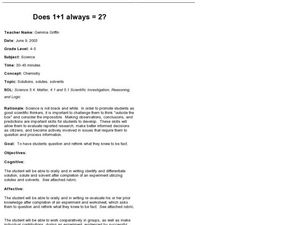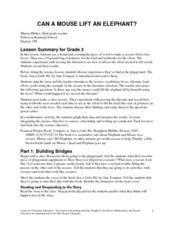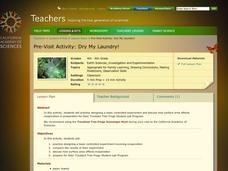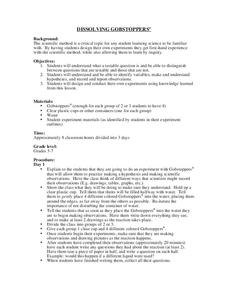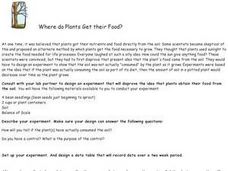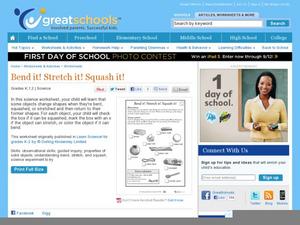Curated OER
Genetically Modified Food (GMF)
Explore genetically modified foods through various experiments. In this biology lesson, students discuss the safety issues related to GMF's. They conduct a PCR analysis to identify the presence of genetic modification.
Curated OER
Does 1 + 1 always = 2
What a great way to explore the scientific process! Learners conduct an experiment in which they use sugar and water to illustrate the concept of solutes and solvents. With this hands on approach, they are bound to remember what they...
Curated OER
Biotechnology Laboratory Research
Students participate in an extended laboratory research to experience how scientific information is obtained, upon which we build scientific knowledge and understanding.
Curated OER
As a Matter of Fact
Elementary-aged scientists discover that all matter has mass. They are shown the difference between mass and weight, and learn how to calculate mass using the appropriate tools and methods. The scientific method is used while estimating...
Curated OER
The Parachute
Students discuss parachutes and write a procedure to determine the effect of different size parachutes and different masses on the time it takes the masses to fall. They record all their data from their experiment then write three...
Curated OER
Starch
Students examine the basics of starch and how it is used in food. In this photosynthesis lesson plan students experiment with variables that affect starch production in photosynthesis.
Curated OER
Can a Mouse Lift an Elephant?
Read Just a Little Bit, by Ann Tompert as an introduction to levers. Discuss playground seesaws and then turn learners loose to experiment with the placement of a fulcrum. Their goal is to determine where to place it in order to lift ten...
California Academy of Science
Dry My Laundry!
Meant to be a pre-field trip lesson, this can also serve as a cute and simple activity to use when your little ones are learning about evaporation or surface area. The children cut tiny t-shirts out of paper towel material, wet them, and...
Center for Learning in Action
Density
Explore the concept of density within states of matter—gases, liquids, and solids—through a group experiment in which young scientists test objects' texture, color, weight, size, and ability to sink or float.
Curated OER
Doing Science
For this doing science worksheet, students review the process of doing a science experiment. Students also match the SI unit with what it measures. This worksheet has 7 fill in the blank and 4 matching questions.
Curated OER
Backyard Bacteria
Students demonstrate safe ways to handle bacteria, prepare agar plates, and grow bacterial cultures. They identify different kinds of bacterial colonies, and devise a controlled experiment.
Curated OER
# 21 Measuring Nitrate by Cadmium Reduction
Students design an experiment to evaluate the effects of various treatments on the nitrogen cycle in a freshwater aquarium. They are required to maintain a laboratory notebook of all work, measure the key analytes of the biosystem at...
Curated OER
The Good and Bad Bacteria
High schoolers are able to name one kind of harmful bacteria and why it hurts us and also name one kind of helpful bacteria and how we use it. They describe the process of growing bacterial cultures in a lab. Students create a reasonable...
Curated OER
Following Directions
Kindergartners learn about the ways force can stop and reverse motion. Several illustrations of children help them determine if the motion is causing an item to change direction. Next, they conduct an experiment to see if a water balloon...
Edgemont Elementary School
Scientific Method Unit
Four out of five teenagers experiment with science by accident. This unit teaches the five parts of the scientific method through examples, guided practice, independent practice, and then through a hands-on experiment. Each step is...
Curated OER
Sky Observations Sky & Cloud Windows
Learners observe the sky and weather to gather data. They conduct experiments to answer questions about the sky and weather phenomena. They measure, analyze and present data. They create sky windows by gluing sky colored paint chips...
Curated OER
Dissolving Gobstoppers
Students design their own experiments . They study the scientific method and determine what a testable question is. They distinguish between questions that are testable and those that are not. They identify variables, make and understand...
Curated OER
Where Do Plants Get Their Food?
Plants need food to survive, just like any other living organism. Young biologists analyze an experiment performed in 1610 by Jan van Helmont to determine if plant nutrition is obtained through the soil. First, lab groups work together...
Curated OER
Ecology
Young scholars explore, experience and experiment identifying the human impact on the environment of vegetative differences within the same biome. They assess what causes deserts, rain forests, savannahs, tundras and saguaros and how...
Curated OER
Bend It! Stretch It! Squash It!
Some items keep their shape no matter what happens! Have your kindergarten class choose which items would stay the same if they were bent, stretched, or squashed. The last activity prompts kids to see what happens when they stretch a...
Curated OER
Does Soil Get Soggy?
Study the properties of soil and water absorption with a science activity. Based on a paragraph with background knowledge on sandy soil, silt, and clay soil, third graders choose which illustration represents a bottle full of sandy soil....
Curated OER
Night Here, Day There
Explore astronomy with a lab sheet for fifth grade scientists. After reading a short explanation about the earth's rotation, they solve a word problem about the differences in times across the world. Next, they make a model of the solar...
Curated OER
Plants have needs, too!
Plants can die if they don't get enough sunlight and water. Kindergartners observe a picture of a hanging plant and grass under a tree, and interpret which each plant has died. Next, they grow watercress seeds in wet cotton to compare...
Mr. Science
The Scientific Method
First, ask a question and then, do research. Next, form a hypothesis, and conduct an experiment. Make observations, gather and analyze data, and then state a conclusion based on the results. This is the scientific method, and here is a...
Other popular searches
- Life Science Experiments
- Egg Science Experiments
- Hands on Science Experiments
- Space Science Experiments
- Food Science Experiments
- 5 Minute Science Experiments
- Simple Science Experiments
- Air Science Experiments
- Fun Science Experiments
- Earth Science Experiments
- Science Experiments Units
- Sea Life Science Experiments



